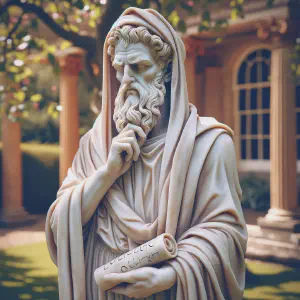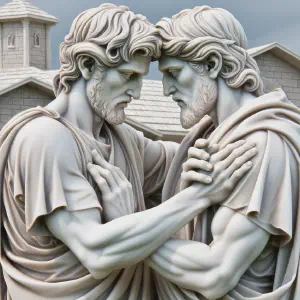Seeds of Faith and Wisdom



Moved by the judge’s wisdom and the power of the scriptures, the brothers reconciled, their hearts transformed by the teachings of faith and forgiveness. The village witnessed a miracle of change, akin to a mustard seed of faith uprooting deep-seated bitterness and planting seeds of love and unity. The judge’s wisdom and the brothers’ journey became a testament to the everlasting way of the Lord, guiding them and their community towards peace and understanding.
Five Questions
What significance does the wise judge in the story hold in relation to the reading from Wisdom 1:1-7?
The judge embodies the virtues extolled in Wisdom 1:1-7. He exemplifies love for justice and integrity of heart, essential for those who judge the earth. His fairness and refusal to entertain perverse counsels mirror the scriptural teaching that wisdom does not dwell in a soul plotting evil or in a body under debt of sin. His character illustrates the principle that true wisdom and closeness to God are found in righteousness and moral integrity.
How does Psalm 139 influence the resolution of the conflict between the two brothers in the story?
Psalm 139, with its emphasis on God’s omnipresence and omniscience, plays a crucial role in resolving the brothers’ conflict. The judge uses the Psalm to remind them that God is aware of all thoughts and actions, encouraging them to be truthful and open-hearted. This realization that they cannot hide anything from God nudges the brothers towards honesty, self-reflection, and ultimately reconciliation, aligning with the Psalm’s message of God’s encompassing knowledge and presence.
In the story, why is Jesus’ teaching from Luke 17:1-6 particularly relevant to the brothers’ situation?
Jesus’ teaching in Luke 17:1-6 addresses the inevitability of sin and the grave responsibility of not leading others into sin. It is relevant to the brothers as it highlights the importance of being accountable for one’s actions. The teaching about forgiveness - forgiving a brother even if he sins repeatedly - directly applies to their situation, urging them to let go of their grudges and embrace forgiveness, just as they are called to forgive others multiple times, mirroring God’s infinite mercy.
What does the story suggest about the nature of faith, particularly in reference to Philippians 2:15d,16a?
The story, in light of Philippians 2:15d,16a, suggests that faith is not just a belief but an active, living force. It is about shining like lights in the world, holding onto the word of life. This is exemplified in the judge’s actions and the brothers’ eventual reconciliation. Their journey reflects a growing faith, akin to the mustard seed mentioned in the scriptures, which, though small, has the potential to create significant change. Faith, therefore, is portrayed as dynamic and transformative.
How does the story as a whole reflect the theme of the Responsorial Psalm, “Guide me, Lord, along the everlasting way”?
The story reflects the theme of the Responsorial Psalm by illustrating how individuals are guided by divine wisdom and understanding along the path of righteousness. The judge, in guiding the brothers, acts as an instrument of God’s wisdom, leading them away from conflict and towards peace and reconciliation. This journey of the brothers, under the judge’s guidance, mirrors the Psalm’s plea for God’s guidance along the everlasting way, emphasizing the role of divine intervention in guiding human actions towards goodness and truth.
Bible Study
Wisdom 1:1-7
Love justice, you who judge the earth;
think of the Lord in goodness,
and seek him in integrity of heart;
Because he is found by those who test him not,
and he manifests himself to those who do not disbelieve him.
For perverse counsels separate a man from God,
and his power, put to the proof, rebukes the foolhardy;
Because into a soul that plots evil, wisdom enters not,
nor dwells she in a body under debt of sin.
For the holy Spirit of discipline flees deceit
and withdraws from senseless counsels;
and when injustice occurs it is rebuked.
For wisdom is a kindly spirit,
yet she acquits not the blasphemer of his guilty lips;
Because God is the witness of his inmost self
and the sure observer of his heart
and the listener to his tongue.
For the Spirit of the Lord fills the world,
is all-embracing, and knows what man says.
This passage focuses on the pursuit of justice and integrity, essential to those who judge the earth. It emphasizes that wisdom is aligned with righteousness and cannot coexist with evil or deceit. This aligns with Catholic values such as the pursuit of truth, the avoidance of sin (as per the Ten Commandments), and the importance of moral integrity. It underscores the Catholic belief in the necessity of a pure heart and a life of virtue for true wisdom to flourish.
Psalm 139:1b-10
R. (24b) Guide me, Lord, along the everlasting way.
O LORD, you have probed me and you know me;
you know when I sit and when I stand;
you understand my thoughts from afar.
My journeys and my rest you scrutinize,
with all my ways you are familiar.
R. Guide me, Lord, along the everlasting way.
Even before a word is on my tongue,
behold, O LORD, you know the whole of it.
Behind me and before, you hem me in
and rest your hand upon me.
Such knowledge is too wonderful for me;
too lofty for me to attain.
R. Guide me, Lord, along the everlasting way.
Where can I go from your spirit?
From your presence where can I flee?
If I go up to the heavens, you are there;
if I sink to the nether world, you are present there.
R. Guide me, Lord, along the everlasting way.
If I take the wings of the dawn,
if I settle at the farthest limits of the sea,
Even there your hand shall guide me,
and your right hand hold me fast.
R. Guide me, Lord, along the everlasting way.
Psalm 139 celebrates God’s omniscience and omnipresence. It depicts God as all-knowing, even to the extent of understanding our thoughts and actions before they occur. This Psalm aligns with the Catholic teaching of God’s infinite knowledge and presence. It also relates to the acts of mercy by encouraging self-awareness and truth in our relationship with God. The Psalm resonates with the Catholic understanding of grace, suggesting that God’s guidance is always present in our lives.
Luke 17:1-6
Jesus said to his disciples,
“Things that cause sin will inevitably occur,
but woe to the one through whom they occur.
It would be better for him if a millstone were put around his neck
and he be thrown into the sea
than for him to cause one of these little ones to sin.
Be on your guard!
If your brother sins, rebuke him;
and if he repents, forgive him.
And if he wrongs you seven times in one day
and returns to you seven times saying, ‘I am sorry,’
you should forgive him.”And the Apostles said to the Lord, “Increase our faith.”
The Lord replied, “If you have faith the size of a mustard seed,
you would say to this mulberry tree,
‘Be uprooted and planted in the sea,’ and it would obey you.”
In this passage, Jesus teaches about the inevitability of sin and the importance of forgiveness. He emphasizes the severe consequences of leading others into sin and the need for continuous forgiveness. This teaching aligns with Catholic values of repentance, forgiveness (one of the spiritual works of mercy), and the responsibility to avoid being a stumbling block to others. It also reflects the Catholic understanding of grace, where even faith as small as a mustard seed can lead to great spiritual growth and miracles.
Lessons
These passages teach us the importance of seeking wisdom and justice with a heart full of integrity and faith. They remind us that God is ever-present and all-knowing, guiding us along the path of righteousness. The teachings of Jesus emphasize the inevitability of sin, yet highlight the profound necessity of forgiveness and repentance. These scriptures collectively encourage us to embrace a life of humility, to be vigilant against causing harm to others, and to forgive endlessly, mirroring the boundless mercy of our Lord.
Meditation Prayer


